高中英语情态动词
- 格式:doc
- 大小:83.50 KB
- 文档页数:12

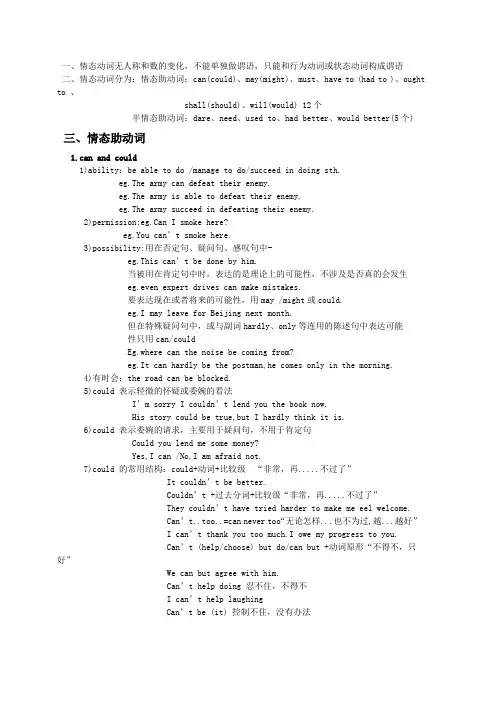
一、情态动词无人称和数的变化,不能单独做谓语,只能和行为动词或状态动词构成谓语二、情态动词分为:情态助动词:can(could)、may(might)、must、have to (had to )、oughtto 、shall(should)、will(would) 12个半情态助动词:dare、need、used to、had better、would better(5个)三、情态助动词1.can and could1)ability:be able to do /manage to do/succeed in doing sth.eg.The army can defeat their enemy.eg.The army is able to defeat their enemy.eg.The army succeed in defeating their enemy.2)permission:eg.Can I smoke here?eg.You can’t smoke here.3)possibility:用在否定句、疑问句、感叹句中-eg.This can’t be done by him.当被用在肯定句中时,表达的是理论上的可能性,不涉及是否真的会发生eg.even expert drives can make mistakes.要表达现在或者将来的可能性,用may /might或could.eg.I may leave for Beijing next month.但在特殊疑问句中,或与副词hardly、only等连用的陈述句中表达可能性只用can/couldEg.where can the noise be coming from?eg.It can hardly be the postman,he comes only in the morning.4)有时会:the road can be blocked.5)could 表示轻微的怀疑或委婉的看法I’m sorry I couldn’t lend you the book now.His story could be true,but I hardly think it is.6)could 表示委婉的请求,主要用于疑问句,不用于肯定句Could you lend me some money?Yes,I can /No,I am afraid not.7)could 的常用结构:could+动词+比较级“非常,再.....不过了”It couldn’t be better.Couldn’t +过去分词+比较级“非常,再.....不过了”They couldn’t have tried harder to make me eel welcome.Can’t..too..=can never too“无论怎样...也不为过,越...越好”I can’t thank you too much.I owe my progress to you.Can’t (help/choose) but do/can but +动词原形“不得不,只好”We can but agree with him.Can’t help doing 忍不住,不得不I can’t help laughingCan’t be (it) 控制不住,没有办法It can’t be helpedCan’t....without 没有...就不能One can’t succeed without perseverance.2.may and might1)permission:May I use your pen?Yes,you may./No,you may not.2)Possibility:用于推测,表示不确定,不用于疑问句中She may know Tom’s address.出现I’m afraid.I’m not sure等表示不确定时,常用may/might.I’m afraid he might not come to attend the meeting today.从语气上判断,may表示的可能性比might 大,might更多的表示怀疑He may be very busy now.He might be very busy now.3)用于让步状语从句中However hard you may study,you cannot master English in a month.4)用于祈使句,表示祝愿May you succeed!5)might 常用于表示轻微的责备和委婉的请求You might post the letter for me if you are going near a post box.You might have let me know before!6)习惯用法:may as well do”理所当然,有足够的理由”She may be proud of her sonMay /might (just) as well do=had better do(最好)You might as well stay at home tonight.May/might as well+do A+as+do+B”与其做B不如做A”You might as well throw the money away as lend it to him.One may as well not know a thing at all as know it but imperfectly 3.must and have to1)表示义务,一定要,必须You must arrive in good time.The meeting is very important.2)表示肯定性或难以避免,必然会,肯定会All men must die.3)must 表示有把握的推测,一定是,准时Must do/must be doing/must have doneThe tall fellow must be a basketball player.Let’s have something.You must be starving.He must have received mu letter which has mailed last week.4)must 表示非要,偏要,常以第二人称为主语,意指不耐或令人不愉快的事情,用于其他人称,表示主语固执,意为偏偏Why must you buy that car?Jane was never a pleasant young girl.After you gave her your advice,she must goand do the opposite.5)must 的三种否定形式表示不可能 must be --can’t be must have done--can’t have done You must have met him before.You can’t have met him before.表示不必 must do--need not to/don’t have toWe must get up at six tomorrow morning.We don’t have to get up at six tomorrow morning.表示决不能,严禁 must--mustn’tYou mustn’t park your car here.6)回答以must提问的句子Must we clean all the rooms?Yes ,you must/No ,you don’t have to/No ,you needn’t7)must 可做名词,表示必须有的东西,必须做的事Warm clothes are a must in the mountains.8)must和have to 表示必须时,有一下差别Must 表示的是说话人主观的看法,而have to则往往强调客观需要The play is not interesting ,I really must go now.I have to work when I was your age.Must 一般只表现在,have to 则有更多的时态。

高中英语知识点归纳情态动词的情态和语气高中英语知识点归纳:情态动词的情态和语气情态动词是英语中常见的一类动词,用来表示说话人的某种态度、意愿、能力等。
它们在句中通常与其他动词搭配使用,帮助表达某种含义。
本文将对情态动词的情态和语气进行归纳。
一、情态动词的情态含义1. Can“Can”表示某种能力或可能性。
当用于陈述句时,表示某人具备某种能力。
例如:- I can swim.(我会游泳。
)- He can speak three languages.(他会说三种语言。
)2. Could“Could”是“can”的过去式,表示过去具备的能力或某种可能性。
它也可以用来表示礼貌地表达请求。
例如:- I could run very fast when I was young.(我小时候跑得非常快。
)- Could you please pass me the salt?(你能请递给我盐吗?)3. May“May”用于表示允许、请求或推测。
例如:- You may go now.(你现在可以走了。
)- May I borrow your pen?(我可以借用你的钢笔吗?)- She may be at home.(她可能在家。
)4. Might“Might”是“may”的过去式,表示过去某种猜测、推测或可能性。
例如:- He might have forgotten the appointment.(他可能忘记了约定。
)- It might rain later.(说不定一会儿会下雨。
)5. Must“Must”表示一种推测或强烈的命令。
例如:- It must be cold outside.(外面肯定很冷。
)- You must finish your homework before going out.(出去之前你必须完成作业。
)6. Shall“Shall”常用于疑问句中,表示征求对方的意见或提出建议。
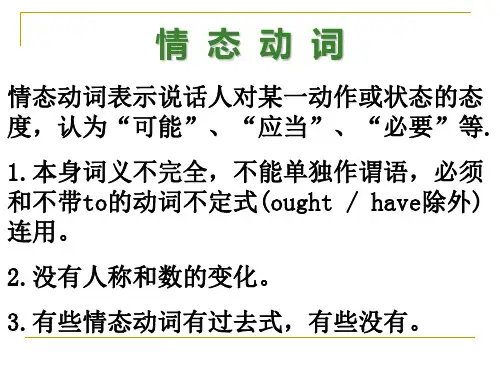
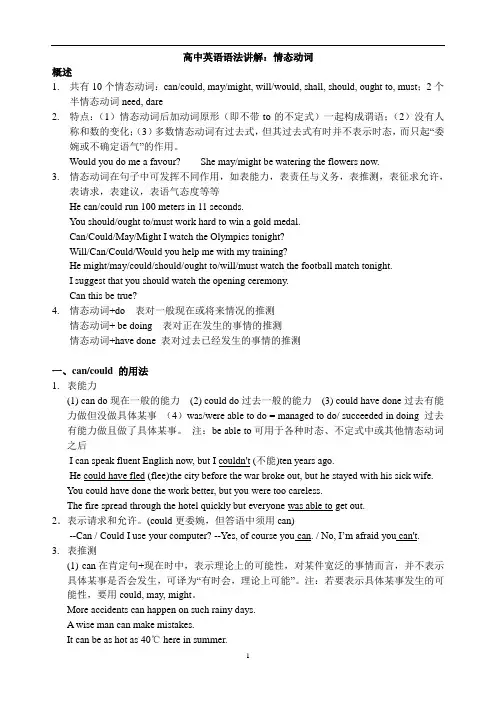
高中英语语法讲解:情态动词概述1.共有10个情态动词:can/could, may/might, will/would, shall, should, ought to, must;2个半情态动词need, dare2.特点:(1)情态动词后加动词原形(即不带to的不定式)一起构成谓语;(2)没有人称和数的变化;(3)多数情态动词有过去式,但其过去式有时并不表示时态,而只起“委婉或不确定语气”的作用。
Would you do me a favour? She may/might be watering the flowers now.3.情态动词在句子中可发挥不同作用,如表能力,表责任与义务,表推测,表征求允许,表请求,表建议,表语气态度等等He can/could run 100 meters in 11 seconds.You should/ought to/must work hard to win a gold medal.Can/Could/May/Might I watch the Olympics tonight?Will/Can/Could/Would you help me with my training?He might/may/could/should/ought to/will/must watch the football match tonight.I suggest that you should watch the opening ceremony.Can this be true?4.情态动词+do 表对一般现在或将来情况的推测情态动词+ be doing 表对正在发生的事情的推测情态动词+have done 表对过去已经发生的事情的推测一、can/could 的用法1.表能力(1) can do现在一般的能力(2) could do过去一般的能力(3) could have done过去有能力做但没做具体某事(4)was/were able to do = managed to do/ succeeded in doing 过去有能力做且做了具体某事。

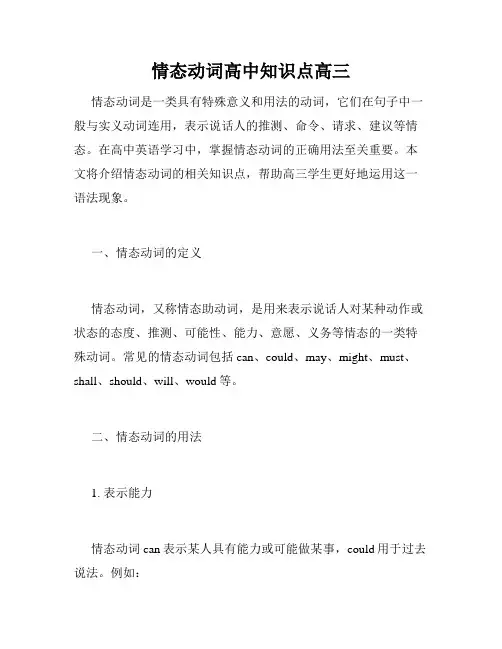
情态动词高中知识点高三情态动词是一类具有特殊意义和用法的动词,它们在句子中一般与实义动词连用,表示说话人的推测、命令、请求、建议等情态。
在高中英语学习中,掌握情态动词的正确用法至关重要。
本文将介绍情态动词的相关知识点,帮助高三学生更好地运用这一语法现象。
一、情态动词的定义情态动词,又称情态助动词,是用来表示说话人对某种动作或状态的态度、推测、可能性、能力、意愿、义务等情态的一类特殊动词。
常见的情态动词包括can、could、may、might、must、shall、should、will、would等。
二、情态动词的用法1. 表示能力情态动词can表示某人具有能力或可能做某事,could用于过去说法。
例如:- She can speak three languages fluently.(她能说流利的三种语言)- He could lift the heavy boxes when he was younger.(他年轻时能搬起这些沉重的箱子)2. 表示推测和可能性情态动词may、might、could用于表示推测和可能性。
may用于表示较为肯定的推测,might和could表示推测的可能性较小。
例如:- The weather is cloudy, it may rain later.(天气多云,可能会下雨)- He might be late for the meeting.(他可能会迟到会议)3. 表示义务和建议情态动词must表示说话人对某种行为具有强烈的责任感或坚决要求,should表示建议。
例如:- We must obey the laws of the country.(我们必须遵守国家的法律)- You should apologize to your friend for your mistake.(你应该为你的错误向朋友道歉)4. 表示许可和请求情态动词can、may、could用于表示允许和请求。
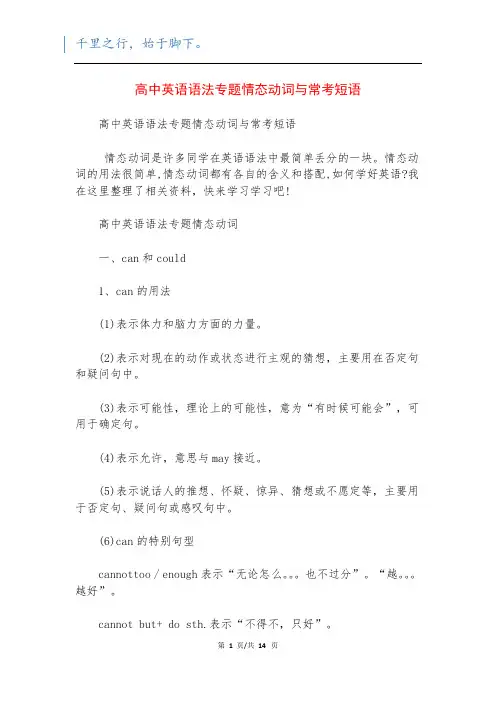
高中英语语法专题情态动词与常考短语高中英语语法专题情态动词与常考短语情态动词是许多同学在英语语法中最简单丢分的一块。
情态动词的用法很简单,情态动词都有各自的含义和搭配,如何学好英语?我在这里整理了相关资料,快来学习学习吧!高中英语语法专题情态动词一、can和could1、can的用法(1)表示体力和脑力方面的力量。
(2)表示对现在的动作或状态进行主观的猜想,主要用在否定句和疑问句中。
(3)表示可能性,理论上的可能性,意为“有时候可能会”,可用于确定句。
(4)表示允许,意思与may接近。
(5)表示说话人的推想、怀疑、惊异、猜想或不愿定等,主要用于否定句、疑问句或感叹句中。
(6)can的特别句型cannottoo / enough表示“无论怎么。
也不过分”。
“越。
越好”。
cannot but+ do sth.表示“不得不,只好”。
2、could的用法(1)表示力量,指的是过去时间。
(2)表示允许,指的是过去时间。
(3)表示可能,可以指过去时间,也可以指现在时间,表示语气缓和。
(4)委婉客气地提出问题或陈述看法,指的是现在时间。
主要用于疑问句,回答时用can。
3、can与could的区分can表推想时只用于否定句和疑问句(could无此限制)。
couldnt 的可能性比cant小。
4、can与be able to的区分(1)现在时:无区分,但后者不常用。
(2)完成时;can没有完成时,此时要用have(has,had)been able to。
(3)将来时:can没有将来时,要用will be able to。
(4)过去时:could表示一般力量,was/were able to 表示在详细场合通过努力胜利做成某事的力量。
二、may 和might1、may的用法(1)表示询问或说明一件事可不行以做。
(2)表示一件事或许会发生或某种状况可能会存在,通常用在确定句和否定句中。
留意:表示可能性时,cant语气强,表示“不行能”,may not 语气弱,表示“可能不”。
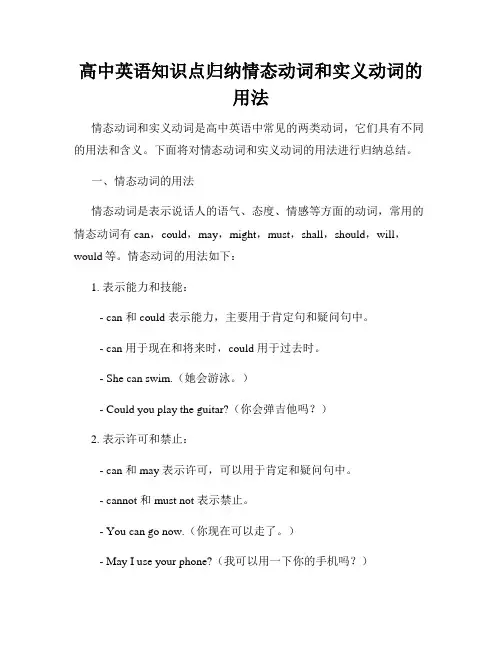
高中英语知识点归纳情态动词和实义动词的用法情态动词和实义动词是高中英语中常见的两类动词,它们具有不同的用法和含义。
下面将对情态动词和实义动词的用法进行归纳总结。
一、情态动词的用法情态动词是表示说话人的语气、态度、情感等方面的动词,常用的情态动词有can,could,may,might,must,shall,should,will,would等。
情态动词的用法如下:1. 表示能力和技能:- can 和 could 表示能力,主要用于肯定句和疑问句中。
- can 用于现在和将来时,could 用于过去时。
- She can swim.(她会游泳。
)- Could you play the guitar?(你会弹吉他吗?)2. 表示许可和禁止:- can 和 may 表示许可,可以用于肯定和疑问句中。
- cannot 和 must not 表示禁止。
- You can go now.(你现在可以走了。
)- May I use your phone?(我可以用一下你的手机吗?)- You must not smoke here.(你不能在这里抽烟。
)3. 表示推测和可能性:- may,might 和 could 表示可能性,可用于肯定和疑问句中。
- may 和 might 可用于现在和将来时,could 可用于过去时。
- He may come tomorrow.(他明天可能来。
)- Could it be true?(这可能是真的吗?)4. 表示义务和建议:- must 和 have to 表示义务,表示说话人的主观意愿。
- should 和 ought to 表示建议或期望。
- We must finish our homework.(我们必须完成作业。
)- You should see a doctor.(你应该去看医生。
)二、实义动词的用法实义动词是指具有实际意义的动词,用来表示具体的动作、状态或变化。
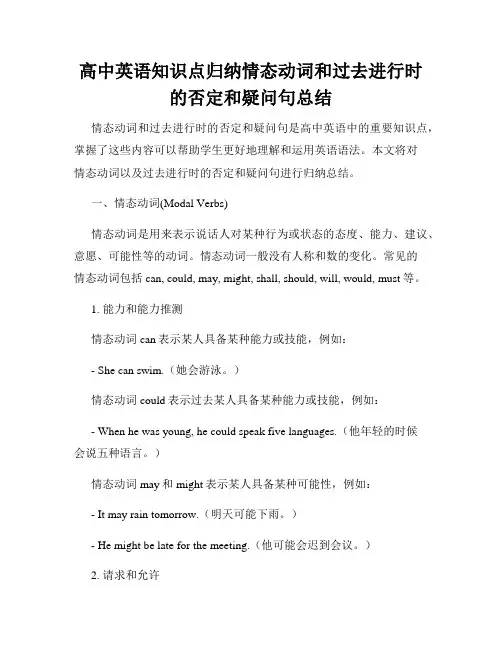
高中英语知识点归纳情态动词和过去进行时的否定和疑问句总结情态动词和过去进行时的否定和疑问句是高中英语中的重要知识点,掌握了这些内容可以帮助学生更好地理解和运用英语语法。
本文将对情态动词以及过去进行时的否定和疑问句进行归纳总结。
一、情态动词(Modal Verbs)情态动词是用来表示说话人对某种行为或状态的态度、能力、建议、意愿、可能性等的动词。
情态动词一般没有人称和数的变化。
常见的情态动词包括can, could, may, might, shall, should, will, would, must等。
1. 能力和能力推测情态动词can表示某人具备某种能力或技能,例如:- She can swim.(她会游泳。
)情态动词could表示过去某人具备某种能力或技能,例如:- When he was young, he could speak five languages.(他年轻的时候会说五种语言。
)情态动词may和might表示某人具备某种可能性,例如:- It may rain tomorrow.(明天可能下雨。
)- He might be late for the meeting.(他可能会迟到会议。
)2. 请求和允许情态动词can和could可用于请求或征询意见,例如:- Can you help me with my homework?(你能帮我做作业吗?)情态动词may和might也可用于请求,但较为正式和客气,例如:- May I ask you a question?(我可以问你一个问题吗?)情态动词can和may还可以用于表示允许,例如:- You can go home now.(你现在可以回家了。
)- May I use your phone?(我可以用一下你的手机吗?)3. 推测和推测的过去形式情态动词must表示对某种情况的推测,认为某事发生是非常有可能的,例如:- He must be tired.(他一定很累。
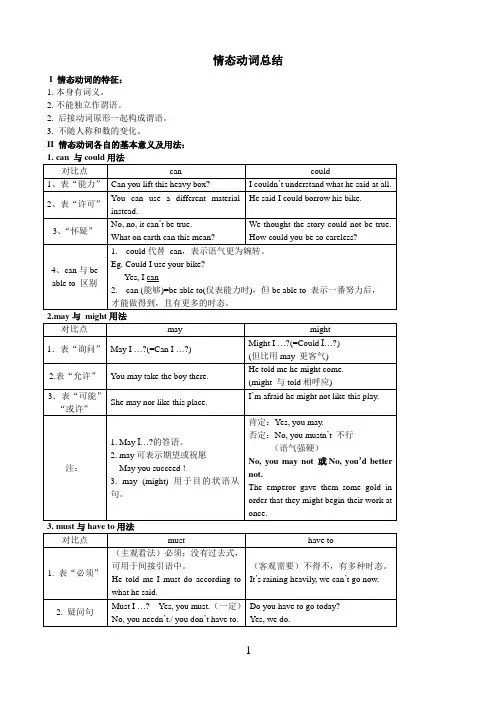
情态动词总结I 情态动词的特征:1.本身有词义。
2.不能独立作谓语。
2. 后接动词原形一起构成谓语。
3. 不随人称和数的变化。
II 情态动词各自的基本意义及用法:1.大多数情态动词(除表‘能力、许可、意志’外),都可以表示推测,其程度有差异。
按可能性程度的高低排列为:must﹥will ﹥would ﹥ought to ﹥should完全肯定完全可能很可能﹥can ﹥could﹥may ﹥might可能有可能2. 区分情态动词的否定含义:may not或许不、可能不might not可能不can’t 不可能mustn’t不许、禁止shouldn’t不应该needn’t 不必1.情态动词表推测的反意疑问句,简单来说,就是以情态动词后的时态为淮,如句子里有明确的时间状语,则以其为准。
2.以must 为例:E.g. 1. You must be hungry now, aren’t you?2. He must be watching TV , isn’t he ?3 Tom must have lived her for a long time, hasn’t he ?4. She must have arrived yesterday, didn’t she?注:如选择题中(以She must have arrived yesterday, didn’t she?为例)既有didn’t she又有hasn’t she则以didn’t she?为最佳答案。
IV 情态动词专项练习与解析一( ) 1. You _____ return the book now. You can keep it till next week if you like.A. can’tB. mustn’tC. needn’tD. may not( ) 2. Where is my pen? I _____ it.A. might loseB. would have lostC. should have lostD. must have lost( ) 3. I wish I _____ you yesterday.A. seenB. did seeC. had seenD. were to see( ) 4. I didn’t hear the phone. I _____ asleep.A. must beB. must have beenC. should beD. should have been( ) 5. If my lawyer _____ here last Saturday, he _____ me from going.A. had been; would have preventedB. had been; would preventC. were; would preventD. were; would have prevented( ) 6. He _____ you more help, even though he was very busy.A. might have givenB. might haveC. may have givenD. may give( ) 7. If it _____ for the snow, we _____ the mountain yesterday.A. were not; could have climbedB. were not; could climbC. had not been; could have climbedD. had not been; could climb( ) 8. Without electricity human life _____ quite difficult today.A. isB. will beC. would have beenD. would be( ) 9. A computer _____ think for itself, it must be told what to do.A. can’tB. couldn’tC. may notD. might not( ) 10. Jenny _____ have kept her word. I wonder why she changed her mind.A. mustB. shouldC. needD. would( )11. We _____ last night, but we went to the concert instead.A. must have studiedB. might studyC. should have studiedD. would study( ) 12. — Could I borrow your dictionary?— Yes, of course you _____.A. mightB. willC. canD. should( ) 13. Tom ought not to _____ me your secret, but he meant no harm.A. have toldB. tellC. be tellingD. having told ( ) 14. — If he _____, he _____ that food.— Luckily he was sent to the hospital immediately.A. was warned; would not takeB. had been warned; would not have takenC. would be warned; had not takenD. would have been warned; had not taken ( ) 15. Peter _____ come with us tonig ht, but he isn’t very sure yet.A. mustB. mayC. canD. will( ) 16. I told Sally how to get here, but perhaps I _____ for her.A. had to write it outB. must have written it outC. should have written it outD. ought to write it out( ) 17. I didn’t see your sister at the meeting. If she _____, she would have met my brother.A. has comeB. did comeC. cameD. had come ( ) 18. — Shall I tell John about it?—No, you _____. I’ve told him already.A. needn’tB. wouldn’tC. mustn’tD. shouldn’t ( ) 19. When a pencil is partly in a glass of water, it looks as if it _____.A. breaksB. has brokenC. were brokenD. had been broken( ) 20. It’s nearly seven o’clock. Jack _____ be here at any moment.A. mustB. needC. shouldD. can( ) 21.— There were already five people in the car but they managed to take me as well.— It _____ a comfortable journey.A. can’t beB. shouldn’t beC. mustn’t have beenD. couldn’t have been ( ) 22. Johnny, you _____ play with the knife, you _____ hurt yourself.A. won’t; can’tB. mustn’t; mayC. shouldn’t; mustD. can’t; shouldn’t ( ) 23. The fire spread through the hotel very quickly but everyone _____ get out.A. had toB. wouldC. couldD. was able to ( ) 24. — When can I come for the photos? I need them tomorrow afternoon.— They _____ be ready by 12:00.A. canB. shouldC. mightD. need( ) 25. — I stayed at a hotel while in New York.— Oh, did you? You _____ with Barbara.A. could have stayedB. could stayC. would stayD. must have stayed ( ) 26. — Will you stay for lunch?— Sorry, _____. My brother is coming to see me.A. I mustn’tB. I can’tC. I needn’tD. I won’t( ) 27. — Are you coming to Jeff’s party?—I’m not sure. I _____ go to the concert instead.A. mustB. wouldC. shouldD. might( ) 28. — Write to me when you get home.— _____.A. I mustB. I shouldC. I willD. I can( ) 29. I was really anxious about you, you _____ home without a word.A. mustn’t leaveB. shouldn’t have leftC. couldn’t have leftD. needn’t leave( ) 30. — Is John coming by train?— He should, but he _____ not. He likes driving his car.A. mustB. canC. needD. may专项练习(二)1. I didn’t see her in the meeting room this morning. She _____ at the meeting.A. mustn’t have spokenB. shouldn’t have spokenC. needn’t have spokenD. couldn’t have spoken2. One ought _____ for what one hasn’t done.A. not to be punishedB. to not be punishedC. to not punishedD. not be punished3. If you really want yourself to be in good health, you must ___ always ___ so much.A. not; be smokingB. not; have smokedC. not; to smokeD. be not; smoking4. With so much work on hand, you _____ to see the game last night.A. mustn’t goB. shouldn’t goC. couldn’t have goneD. shouldn’t have gone5. Most of the students felt rather disappointed at the English party. They say that it ______ better organized.A. had beenB. had to beC. must have beenD. could have been6. I’m surprised that he _____ in the exam.A. should failB. would have failedC. may have failedD. should have failed7. The little girl _____ there alone.A. not dare goB. dares not goC. dare not goD. dare not to go8. “Must we do it now?” “No, you _____.”A. won’tB. needn’tC. can’tD. don’t9. He said he would rather not _____ it right now.A. doingB. to doC. doD. to be doing10. You _____ to the meeting this afternoon if you have something important to do.A. needn’t to comeB. don’t need comeC. don’t need comingD. needn’t come11. Put on more clothes. You _____ be feeling cold with only a shirt on.A. canB. couldC. wouldD. must12. I _____ play football than baseball.A. would ratherB. had betterC. like betterD. prefer13. I thought you _____ like something to read, so I have brought you some books.A. mayB. mightC. couldD. must14. There was plenty of times. She _____.A. mustn’t have hurriedB. couldn’t have hurriedC. must not hurryD. needn’t have hurried15. The plant is dead. I _____ it more water.A. will giveB. would have givenC. must giveD. should have given16. You _____ return the book now. You can keep it till next week if you like.A. can’tB. mustn’tC. needn’tD. may not17. It’s still early, you _____.A. mustn’t hurryB. wouldn’t hurryC. may not hurryD. don’t have to hurry18. Please open the window, _____?A. can’t youB. aren’t youC. do youD. will you19. We _____ for her because she never came.A. mustn’t have waitedB. shouldn’t have waitedC. mustn’t waitD. needn’t wait20. — May I stop here? — No, you _____.A. mustn’tB. might notC. needn’tD. won’t21. It’s a fine day. Let’s go fishing, _____.A. won’t weB. will weC. don’t weD. shall we22. I didn’t see her in the meeting room this morning. She _____ at the meeting.A. mustn’t have spokenB. shouldn’t have spokenC. needn’t have spokenD. couldn’t have spoken23. — Please don’t make a noise. — _____. I’ll be as quiet as a mouse.A. Yes, I won’tB. No, I won’tC. No, I willD. Yes, I will24. The young man has made so much noise that he _____ not have been allowed to attend the concert.A. couldB. mustC. wouldD. should25. — Where is John? — He _____ in the library.A. should beB. must beC. can beD. must have been26. Since the road is wet this morning, _____ last night.A. it must rainB. it must be rainingC. it must have rainedD. it must have been rain27. — Will your brother stay home tonight?— I’m not quite sure. He _____ to the cinema tonight.A. must goB. can goC. may goD. may be going28. She’s already two hours late. What ______ to her?A. can have happenedB. may have happenedC. should have happenedD. must happen29. You must be a writer, _____?A. mustn’t youB. are youC. must youD. aren’t you30. I got up early that morning, but I _____ so because I had no work to do.A. mustn’t have doneB. didn’t need to doC. needn’t have doneD. can’t have done31. He _____ have come here yesterday, but he didn’t.A. couldB. shouldC. ought toD. all the above32. I missed the last bus, so I _____ go home on foot.A. mustB. have toC. mayD. had to33. He ought to win the first prize, _____ he?A. oughtn’tB. shouldn’tC. mustn’tD. both A and B34. Everyone _____ do his best for the modernizations of our country.A. canB. mayC. shouldD. might35. Let’s clean our classroom, _____?A. will youB. don’t weC. shall weD. do you36. Let us play basketball, ______?A. will youB. don’t weC. shall weD. do you37. He asked me for this book many times. Please tell him that he _____ have it tomorrow.A. mustB. mayC. shallD. both B and C38. “Your phone number again? I _____ quite catch it.” “It’s 9568442.”A. didn’tB. couldn’tC. don’tD. can’t39. Mother _____ us stories when we were children.A. was used to tellB. is used to tellingC. used to tellD. used to telling40. She would rather _____ more money on books _____ on clothes.A. cos t … notB. to spare … don’tC. pay … thanD. spend … than专项练习(三)1. — Has Li Lin started? He said he would join in the party.— He ______. He is a man of keeping his word.A. could have leftB. must have leftC. can’t comeD. won’t be c oming2. — May I park my car here?— No, you ______. No car is allowed to park here.A. may notB. needn’tC. mustn’tD. daren’t3. — Excuse me, could you tell me where the Yajia Supermarket is?—It’s two blocks straight ahead. You ______ miss it.A. mustn’tB. can’tC. needn’tD. shouldn’t4. — I saw Mr. Sun at Tongyu Station this morning.—You ______. He’s still on holiday in Hawaii.A. couldn’t haveB. mustn’t haveC. shouldn’tD. needn’t5. — How about paying a visit to Dr. Wang, our former Chinese teacher?— Good idea. I will e-mail him today so that he ______ know ______ to expect us.A. shall; whyB. could; whenC. would; whatD. will; how6. Everything has two sides. Beautiful songs, sometimes, ______ be just noise to others.A. mustB. mayC. shouldD. could7. Someone ______ my umbrella. I found it wet yesterday.A. must be usingB. must have usedC. must useD. must have been using8. — How dangerous it was!— Yes, but for the passer-by’s quick action, th e girl ______.A. was drownedB. could have been drownedC. had drownedD. should be drowned9. You ______ scold such a pupil who always keeps silent so seriously that you ______ hurt him.A. should; canB. may; willC. mustn’t; mayD. can’t; must10. — Why does Alice know so much about Angkor Wat?— She ______ have been there, or ...A. mustB. oughtn’t toC. mayD. can’t11. —You may laugh, but I’ve been thinking of becoming a vegetarian.— Oh, you ______ be crazy. You will be hungry all the time.A. mustB. mayC. willD. need12. —What’s the matter with you?—Oh, I’m not feeling well in the stomach. I ______ so much fried fish just now.A. shouldn’t eatB. mustn’t have eatenC. shouldn’t have eatenD. mus tn’t eat13. — ______ he have been chosen as captain of the football team?— Yes, he ______.A. Can; must haveB. Must; must haveC. Can; mustD. Must; must14. Mr. Zhang ______ in Shanghai tomorrow morning.A. can have arrivedB. will have arrivedC. may have arrivedD. must have arrived15. Miss Wang started at 8 o’clock, and she ______ be there now.A. shouldB. canC. can’tD. need16. — It must be Mr. Li who did it. — No, it ______ be Mr. Li.A. mustn’tB. wouldn’tC. can’tD. may17. You ______ finish reading the book as soon as possible.A. mayB. canC. needD. should18. — Need you go to work now? — Yes, I ______.A. mustB. needC. canD. dare19. Your trousers are dirty. ______ them for you?A. Shall I washB. Will I washC. Am I going to washD. Am I washing情态动词专项练习与解析一【练习解析】1.C 从原题中You can keep it till next week if you like这一信息句可知,“你不必现在还”。
高中英语知识点归纳情态动词与情态副词的区别与用法情态动词和情态副词是英语语法中的两个重要概念,尽管它们在形式上相似,但在用法和含义上有一些区别。
本文将详细介绍情态动词和情态副词的区别和用法。
一、情态动词的定义和用法情态动词是一类特殊的助动词,用于表示说话人的态度、情感或推测。
常见的情态动词有can、could、may、might、shall、should、will、would、must等。
1. 表示能力和才能:- Can:表示能力、许可或请求,用于肯定句和疑问句中。
- He can swim.(他会游泳。
)- Can I borrow your pen?(我能借用你的笔吗?)- Could:过去式,表示过去的能力或请求。
- I could run faster when I was young.(我小时候跑得更快。
)- Could you open the window, please?(请你开下窗户好吗?)2. 表示推测和建议:- May:表示可能性、允许性或请求。
- It may rain tomorrow.(明天可能会下雨。
)- May I use your phone?(我可以用一下你的手机吗?)- Might:表示较小的可能性或社交礼貌。
- He might be at home.(他可能在家。
)- Might I have a glass of water, please?(我可以请你倒杯水吗?)3. 表示义务和建议:- Shall:主要用于疑问句或表示请求或建议。
- Shall we go now?(我们现在走吗?)- You shall do your homework.(你必须完成作业。
)- Should:表示应该、建议或责任。
- You should apologize.(你应该道歉。
)- She should study harder.(她应该更加努力学习。
)4. 表示必须和命令:- Must:表示必须、必要或断定。
高中英语语法之情态动词一、概念情态动词是表示能力,义务,必须,猜测等说话人的语气或情态的动词。
二、相关知识点精讲1.can1)表能力can 表能力时意味着凭体力或脑力或技术等可以无甚阻力地去做某事。
I can climb this pole.我能爬这根杆子。
He is only four , but he can read.他只有4岁,但已认得字了。
Fir e can’t destroy gold.火烧不毁金子。
因为 can 不能和其他助动词连用,所以表示将来式时用will be able to。
You will be able to skate after you have practiced it two or three times.你练习两三次后就会溜冰了。
2)表可能性多用于否定与疑问结构中,但也可用在肯定句中。
Can the news be true?这消息可能是真的吗?It can’t be true.它不可能是真的。
What can he possibly mean?他可能是什么意思?can 用在肯定句中表示理论上的可能性(一时的可能)。
Attending the ball can be very exciting.The road can be blocked.这条路可能会不通的。
may 在肯定句中表示现实的可能性。
The road may be blocked.这条路可能不通了。
3)表示允许(和 may 意思相近)常见于口语。
Can (May) I come in ?我能进来吗?Can I smoke here ?我可以在这里抽烟吗?2.could 的用法1)表过去的可能和许可,(多用于间接引语中)At that time we thought the story could not be true.那时我们认为所说的事不可能是真的。
Father said I could swim in the river.爸爸说我可以在河里游泳。
高中英语知识点归纳情态动词和实义动词的用法讲解一、情态动词的定义和用法情态动词是一类特殊的助动词,用来表示说话人对某种行为或状态的态度、情感或推测等。
情态动词常用于与实义动词连用,构成谓语。
下面对几个常见的情态动词进行归纳和用法讲解。
1. can/could:a) 表示能力、可能性或许可:She can swim.(她会游泳)b) 表示请求或邀请:Can you lend me your pen?(你能借给我你的笔吗?)c) 表示推测:He could be at home now.(他现在可能在家)2. may/might:a) 表示可能性:It may rain tomorrow.(明天可能会下雨)b) 表示请求或许可:May I use your phone?(我可以用一下你的电话吗?)c) 表示祝愿:May you have a happy birthday.(祝你生日快乐)3. must:a) 表示必须或肯定:You must finish your homework.(你必须完成作业)b) 用于反问句,表示强烈的建议或命令:Must I go now?(我现在必须离开吗?)4. shall/should:a) shall用于第一人称,表示将来的意愿、承诺、建议或命令:I shall help you with the housework.(我会帮你打扫房间)b) should用于其他人称,表示应该、建议或推测:You should exercise regularly.(你应该经常锻炼)5. will/would:a) 表示将来的意愿、决心或承诺:I will visit my grandparents this weekend.(这个周末我将去看望我的祖父母)b) would用于过去的愿望、习惯或客气的请求:He would always help others when he was young.(他年轻时总是帮助别人)二、实义动词的定义和用法实义动词是指表示实际动作或状态的动词。
2023版人教高中英语必修一情态动词表1. Can- 表示能力:能够做某事- 示例:我们可以参加派对。
We can attend the party.2. Could- 表示过去的能力或可能性- 示例:我小时候能和好多人玩耍。
I could play with many people when I was young.3. May- 表示可能性或许可- 示例:4. Might- 表示微弱的可能性或许可- 示例:我们可以去公园玩,但也许会下雨。
We might go to the park, but it might rain.5. Must- 表示必须、肯定或推测- 示例:我们必须遵守学校的规定。
We must follow the school's regulations.6. Shall- 表示征求意见或提议- 示例:我们明天去游泳,好吗? Shall we go swimming tomorrow?7. Should- 表示应该、建议或责任- 示例:我们应该关心环境保护。
We should care about environmental protection.8. Will- 表示将来的动作、意图或意愿- 示例:我们明天会去购物。
We will go shopping tomorrow.9. Would- 表示愿意、过去的意愿或虚拟条件- 示例:如果我有时间,我会帮你。
If I had time, I would help you.10. Ought to- 表示应该、理应- 示例:你应该尽早开始学习。
You ought to start studying early.。
高考英语语法复习情态动词与虚拟语气知识讲解一、情态动词(1)表示能力时,can只用于一般现在时,could仅用于一般过去时;而be able to则有更多的时态,如将来时、完成时等。
I haven’t been able to read that report yet.He will be able to skate as well as you.(2)Was/were able to表示能力时,侧重经过努力而成功做到某事;而could仅表示具备能力,不说明是否实施了能力。
He studied hard and was able to pass the exam.(3)用在其他动词,如might,may,would,want,hope等之后表示能力只能用be able to。
He might be able to fix your car.(1)must还可以表示质问或感情色彩,意为“偏要,偏偏”。
Why must it snow on Saturday?(2)should还可以表示惊奇、愤怒、失望等特殊情感,尤其用在以why,who,how等开头的疑问句中或某些感叹句中。
why should you be so late today?(1)must作“必须”讲的一般疑问句,其肯定回答用must,否定回答用needn’t或don’t have to。
-Must I pay now?-Yes, you must./No, you needn’t.(2)need还可以作实义动词,有人称和数的变化,后跟带to的不定式作宾语。
She needed to go out for a walk.(1)两者在表示过去的习惯动作或行为时常可通用。
When we were children, we would/used to go skating every winter.(2)Used to与would都不能与表示具体频率、次数的词及特定的时间状语或具体的一段时间连用。
Plants must have oxygen in order to live. 为了存活植物必须有氧气。
A plant must have oxygen in order to live. 为了存活植物必须有氧气。
D. 情态动词的时态并不是区分时间的主要标志。
在一些场合中,情态动词的现在式和过去式都可以表示现在时间、过去时间或将来时间。
I'm afraid it might rain tonight. 我看今晚可能要下雨。
Could I borrow your thermos?我可以借用你的暖水瓶吗?It's a nice day today. We could go for a walk. 今天天气不错,我们可以出去散散步。
E. 情态动词是互相排斥的,一般不允许两个意义相近的情态动词连用。
【误】Soldiers must have to obey orders.【正】Soldiers have to obey orders. 军人必须服从命令。
【正】Soldiers must obey orders. 军人必须服从命令。
【误】Can I be able to borrow two books at a time?【正】Can I borrow two books at a time? 我能一次借两本书吗?【正】Will I be able to borrow two books at a time ? 我能一次借两本书吗?二、情态动词的意义和用法A. may和might1.表示请求、许可,常译为“可以”。
在口语中可用can, could代替may,但在正式场合用may。
表示允许时,也可用might代替,might不表示过去时,而是表示口气比较婉转。
You may take this seat if you like. 如果你喜欢可以坐这个位置。
May/Can /Could/ Might I have a talk with you ? 我可以和你谈谈吗?--- May/Might I come into the room to see my mother? 我可以进房间看我母亲吗?--- No, you mustn't. She needs to have a good rest. 不,你不能进。
她需要好好休息。
提示:May I ... 问句常见的肯定回答和否定回答。
肯定回答Yes, please. Certainly. Yes, of course. Sure. Go ahead, please.否定回答No, you can't. (最常见)No, you mustn't. (具有强烈禁止的意思)Please don't. You'd better not. I don't think you can. I'm sorry it's not allowed.2.表示推测,可译为“可能,也许”。
Your math teacher maymight be in his office. 你们的数学老师可能在办公室里。
(一般情况下,might 表示的可能性很小)The light isn't on. It maymight be broken. 那盏灯没有亮,它可能坏了。
There may might be some ink left in the bottle. 瓶子里也许还剩点儿墨水。
注意:用may表示推测一般不用于疑问句,在疑问句中通常用can来代替。
Can he be at home? 他可能在家吗?--- Can it be true? 这可能是真的吗?--- It may be, or may not be. 可能是,也可能不是。
3.用在目的状语从句中,构成谓语。
He wants to take a taxi so that he may get there in time.他想坐出租车,这样他就能及时到达那里。
I arrived at the airport earlier in order that I might meet him.我早早地就到了机场为了能接到他。
4.有时可以用于祈使句表示祝愿。
May you succeed. 祝你成功May you be happy. 祝你快乐。
May that day come soon. 希望这一天早日到来。
B. can和could1.表示能力,可译为“能,会”。
I can swim. 我会游泳。
Emily can dance well and her mother could dance well when she was young.艾米丽舞跳得很好,她妈妈年轻时舞跳得也很好。
The cinema can seat 1,000 people. 这电影院能容纳1,000人。
I could not read such an easy book when I was 7 years old.我七岁时连如此简单的书我也看不懂。
2.表示允许、许可,常用在口语中。
could比can语气上要客气。
--- Could I use your dictionary? 我可以用一下你的字典吗?---Yes, go ahead. 可以,用吧。
(或Yes, you can. 但不能说Yes, you could.)Could Can you tell me how to get to the zoo? 劳驾,你能告诉我怎么去动物园吗?He asked me whether he could take the book out of the reading room.他问我可不可以把书带出阅览室。
3.表示推测,可用于肯定句(can罕见)、否定句和疑问句,但更常见于疑问句或否定句。
在此种用法中can和could没有时态的区别,只是表示可能性的大小,can表示推测的可能性比could大。
Can he be ill at home? 他会是生病在家吗?Can the story be true? 这个故事会是真的吗?He cannot be at home. 他不可能在家。
You mustn't smoke while you are walking around in the woods. You could start a fire.在林子里走时一定不要吸烟,那样可能会引起火灾。
4.表示惊异、怀疑、不相信等态度,主要用于否定句和疑问句中。
How can you be so careless? 你怎么这么粗心?Where can could they have gone? 他们会去了哪里?He can'tcouldn't be over sixty. 他不可能超过60岁。
5.Could可以用在虚拟条件句中。
If I could fly, I should be very happy. 如果我能飞,我会很高兴。
If you had followed my advice, you could have finished it.如果你当时听我的,你早就做完了。
If you had tried harder, you could have passed your exam.如果你再努力些,你就能通过考试了。
6.can与be able to的区别①can表示“能力”时,和be able to相当,许多场合都可以互相替换。
但当叙述过去经过一番努力才能完成的事情或前面有特殊说明,表示你有能力时,只能用be able to。
【正】Can you speak any foreign languages? 你会说外语吗?【正】Are you able to speak any foreign languages? 你会说外语吗?【误】The fire spread the building quickly but everybody could escape.【正】The fire spread the building quickly but everybody was able to escape.大火迅速蔓延到整幢大楼,但大家都逃了出来。
【正】The fire spread the building quickly but everybody managed to escape.大火迅速蔓延到整幢大楼,但大家都想法逃了出来。
②be able to 比can有更多形式。
No one could answer the question.没人能回答这个问题。
(这里could可用was able to 代替)When he grows up, he will be able to support his family. 他长大后就能养家了。
Frank is ill. He hasn't been able to go to school for one week.弗兰克病了,已经一周没去上学了。
I'm sorry for not being able to help you in time. 对不起,不能及时帮你的忙。
③could经常和动词see, hear, smell, taste, feel, remember, understand等连用。
When we went into the house, we could smell something burning.当我们走进屋子时,我们闻到什么东西烧焦了。
(不用was able to)She spoke in a very low voice, but I could understand what she said.虽然她讲话的声音很低,但我还是明白了她说的话。
④在谈论说话时发生的动作,用can,不用be able to。
【误】Look! I'm able to swim.【正】Look! I can swim. 看,我会游泳了!C.must和have to1.must表示有做某一动作的必要或义务,强调主观看法,可译为“必须,应该”。
Everyone must obey the rule. 人人都必须遵守制度。
We must do everything step by step. 我们必须逐步做每件事。
Teachers must be patient enough with their students. 老师必须对学生有足够的耐心。